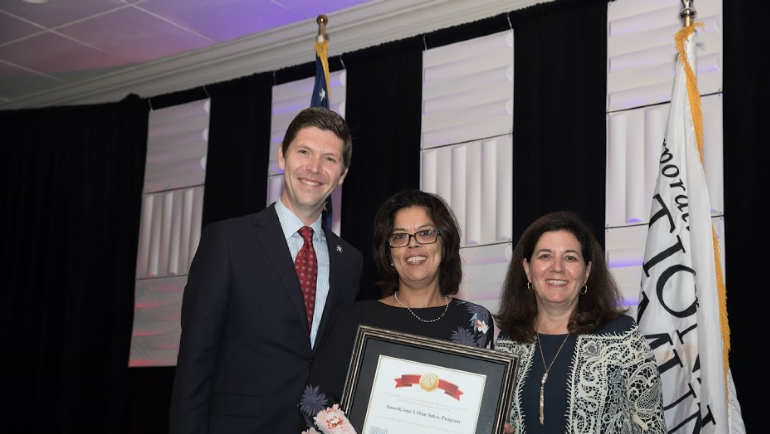
The four fresh-faced volunteers stroll onto the porch of the older house on Detroit’s west side and begin knocking on the door. A resident answers a moment later. Soon after that, the team is hard at work.
Wayne State University graduate students Morgan Rote and Sarah Monhollen conduct an interview with the resident and inspect the home for 15 possible safety hazards, including child lead poisoning, asthma risks and smoke detectors.
Charles Harris prepares to install smoke and carbon monoxide detectors while the fourth team member, Ayne Jeilani, unwraps other equipment. After assessing the needs of the home, the team installs two smoke detectors, a carbon monoxide detector and a deadbolt lock.
The volunteers are members of the AmeriCorps Urban Safety Program (AMUS) and work to provide the resident with all of the quick safety fixes applicable. The concerns that the team are unable to resolve are outsourced and residents are connected with outside resources.
This isn’t just a one-off occurrence or seasonal offering from AmeriCorps; it is a daily routine. After this installation, the team moved on to the next home, imitating the same procedure until all appointments were done for the day. Depending on the day, the AMUS team can service up to four houses in Detroit each day, primarily installing fire and carbon monoxide detectors.
AmeriCorps has been situated at Wayne State for nine years, located in the Academic/Administrative Building, and is overseen by the Center for Urban Studies. AmeriCorps initiatives are executed by approximately 80 volunteers a year, 10 percent of whom are Wayne State students. Members can serve a 300-service-hour term or a full term of 1,700 service hours. For some residents, installing the basic safety devices are just the beginning.
AmeriCorps also has members who work with city precincts to assist those battling domestic violence issues by putting together safety plans and personal protection orders. A computer statistics team analyzes and combines real-time crime mapping with neighborhood prevention and safety intervention measures.
With all of these measures, AmeriCorps volunteers are working to provide the safest Detroit possible, and it is this unwavering service that in September earned the AMUS program the 2018 Social Innovation and Impact Award from the Corporation for National and Community Service.
"It is an honor and privilege to accept the award on behalf of the Wayne State University and the Center for Urban Studies, the members and staff that are committed to service and community,” said Ramona Washington, director of the program, during her acceptance speech. “It is important for everyone to know that every member makes a difference, and service makes a difference in the life of every member."
It also makes a difference to the residents and communities served by the program.
“When people have an abandoned house next to their home, they tell us,” said Ayne Jeilani, a member of the AMUS "home safety assessment" teams that identify homes for improved security. “Sometimes we’ll even take the initiative of letting the city know, because a lot of times when we do board-ups, it’s a bigger project with all of the teams, but sometimes it has to be done right away. We can’t wait for a bigger project, so we’ll let the city know so they can board up that home.”
AmeriCorps operates as an umbrella, offering multiple layers of urban safety services aimed at enhancing home and community safety. Boarding up abandoned homes is critical because they often can facilitate crime. AmeriCorps also boards up houses that are abandoned along designated Safe Routes to School to ensure student safety. The group boards up about 25 homes at each of its four annual service events.
“We follow the routes that most students are walking to school,” said Washington. “We also work with community patrols and connecting the community with organizations and law enforcement.”
And to the AmeriCorps participants at WSU, the strength of those connections is where the real security lies.
